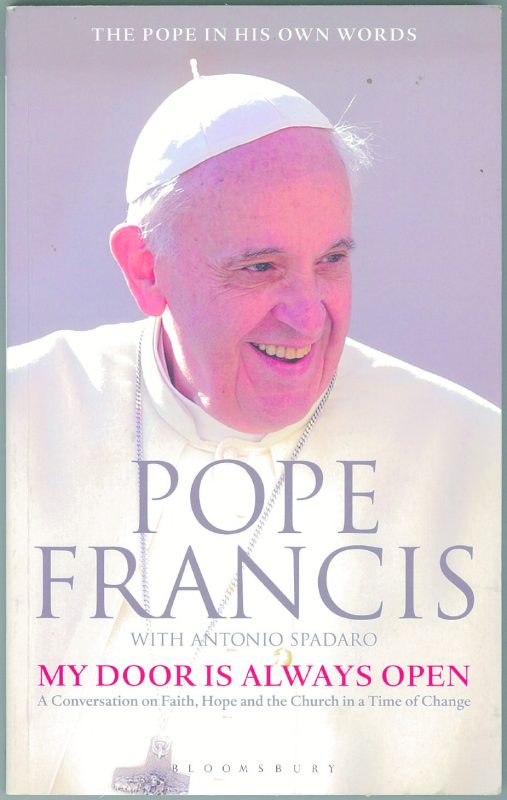Faith, Hope and the Church in a Time of Change with Antonio Spadaro (Bloomsbury Acad & Prof 2013 (Allen & Unwin Auckland (09) 377 3800)); $36.99. Reviewed by PETER GRACE.
 Over a month in August and September 2013, Fr Antonio Spadaro, SJ, the head of La Civilta Cattolica, interviewed Pope Francis over a total of six hours. The result is My Door is Always Open.
Over a month in August and September 2013, Fr Antonio Spadaro, SJ, the head of La Civilta Cattolica, interviewed Pope Francis over a total of six hours. The result is My Door is Always Open.
I read this over several weeks, a little at a time. That, for me, was the best way to take it in.
That might suggest it is hard to read. But that’s not so. It’s just that Pope Francis’s thought is so rich, that digestible chunks each time worked best for me.
An interesting insight the Pope offers about himself — given that some think he has a tendency to speak off the cuff without enough thought — concerns the question of what it means for a Jesuit to be elected pope.
“Discernment,” he offers, then provides a depth of explanation.
But then he says: “I am always wary of the first decision, that is, the first thing that comes to mind if I have to make a decision. This is usually the wrong thing.”
The text has the “ums” and “aahs” and false starts of trains of thought and suchlike removed.
In other words, it is an edited transcript. But it also includes a commentary by Fr Spadaro. Fortunately, this is judiciously done so that it adds value rather than becoming annoyingly intrusive.
In one such comment, Spadaro notes that when Bergoglio was provincial of the Jesuits in Argentina, he
learned to his own cost that stable, lasting decisions are not taken by instinct.
“[The Pope’s] initial words come back: ‘I am a sinner who is looked upon by the Lord.’”
Earlier this month the Pope, referring to October’s Extraordinary Synod, talked of being at peace with
a period of disagreement and incompleteness relating to discussions around particular controversial
topics. Reading this book seems to show that this kind of acceptance of uncertainty is a product of his “Jesuitness”.
He seems to have an ability to cope with situations and challenges that have been the experience
of people important to him, like Pedro Arrupe, Matteo Ricci and Roberto de Nobili, “men of incomplete
and open thought”, as the interviewer notes.
The conversation is is divided into six broad “chapters”. The six outlines are along the lines of:
• Who is Jorge Bergoglio? • “Thinking with the Church.” • Seeking and finding God in all things. • Art and creativity. • Prayer. • “Wake up to the World!” — Conversation with Pope
Francis about the religious life.
Spadaro comments that the Pope is at once volcanic and serene. “I perceive that this internal condition is rooted in prayer.” And further on: “We must ‘pray with the flesh, not with ideas’, Pope Francis said on 5 June 2013 in his morning homily at Santa Marta.”
Anybody who has been inclined to judge Pope Francis as a bit of a loose cannon in the way he speaks freely to the media should read this book. It should help reassure them that he is a thinker and a man of prayer.
Peter Grace, married with two adult children, is editor of NZ Catholic.
Conversation gives a fuller picture of who the Pope is

Posted in Reviews
Reader Interactions